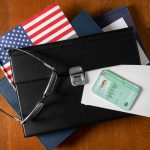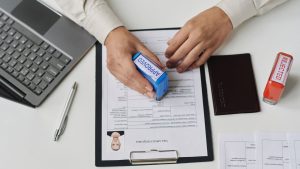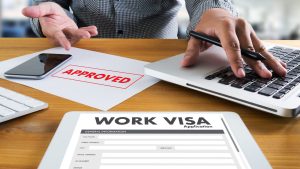Table of Contents
Introduction
Let’s be honest: getting a U.S. visa is stressful. You collect papers, fill out forms you don’t really understand, perhaps dream about starting a new life in the U.S. But then the embassy tells you, “Application rejected.”.
But let me tell you the truth that nobody tells you: most visa rejections are not about you. It’s missing details, documents not adding up, or you simply not understanding what the consular officer wants to hear.
If you’re about to try again, or apply for the first time, in this guide, you will find out a simple and clear breakdown of why U.S. visa applications get rejected and how you can avoid making the same mistakes again and get your dream visa this time.
Mistakes in Your Application
You will need to fill out the DS-160 form for the majority of U.S. visa applications. It asks you your occupation, travel, education, and personal data. Careless mistakes such as wrong date, incomplete address, or inconsistency with what appears on your documents could cause rejection of your U.S. visa application.
These are more common than you can ever think. The majority of applicants unknowingly provide dates of employment that conflict with their experience letters, or leave out half the address, such that it’s difficult to pinpoint the right address during the visa interview. Officers would consider this a discrepancy, and this could lead to a visa rejection.
Also Read: How To Choose Medical Colleges Abroad For Indian Students
How to avoid this:
- Carefully fill out your DS-160 form and retain a copy so you won’t forget what you have mentioned.
- Double-check that your dates of employment, travel, and address are spelt out exactly as they appear in your documents.
- If there is something tricky involved (such as an employment gap), have an explanation ready to explain clearly when you are interviewed.
Prove You Will Return
For visitor and student visas, the biggest reason for rejection is failing to prove you’ll return home. Under Section 214(b), every applicant is seen as a potential immigrant until proven otherwise.
A lot of students from India face rejection because they don’t show strong family ties, stable income sources, or a clear post-study plan.
How to avoid this:
- Take property documents, evidence of family obligations, or a letter of employment with you.
- Be prepared to clarify your post-visit or studies career ambitions.
- Be relaxed and confident while explaining. They require clarity, not a speech.
Financial Evidence: Proving You Can Afford Your Stay in the U.S.
To obtain your U.S. visa, you must demonstrate that you will be able to maintain your stay without having to work illegally in the country. Visa officials need to know that you possess sufficient funds and that your funds are stable, not only for you but also for your sponsor in case you have one.
How to avoid this:
- Present bank statements demonstrating consistent funds for a minimum of 6 months, not mere last-minute deposits.
- Bring tax returns, pay slips, and sponsorship letters if someone else is sponsoring you.
- Avoid a big last-minute deposit that can appear suspicious.
Past Visa or Immigration Issues
If you ever overstayed a visa, worked illegally, or violated any immigration law, failing to disclose these details can result in rejection of your U.S. visa application.
These are not just minor mistakes; they fall under serious U.S. legislation like Sections 212(a)(6)(C)(i) and 212(a)(9)(B), which can make you ineligible for a visa or involve lengthy bans (3, 10 years, or more)
How to avoid this:
- Be truthful always when declaring any previous violations on your U.S. visa application and in your interview.
- Offer official documents such as exit documents, court documents or settlements that detail the resolution of the problem.
- In case you have serious history, such as overstays or illegal work, then it is advisable to seek the services of an immigration lawyer before re-applying.
Criminal Records and Security Flags
Even small legal problems in your history can come back to haunt your U.S. visa application process. If you have ever been arrested or charged, even if the charge was dropped, the visa officer will demand documentation of what occurred. If you withhold these facts, it can result in rejection or even bans in your U.S.visa application process.
How to avoid this:
- Disclose completely all previous legal problems, however minor, on your application and at your interview.
- Bring the records from court, police certificates, or any other legal documents stating the decision of your case.
- Be honest and transparent to avoid issues or a life ban later.
Submission of Wrong Visa or Incomplete Documents
One of the most frequently surprising reasons for visa refusal is filing for the incorrect category of visa or failing to include the right documents for your vacation. For instance, if you’ve filed a business visa but your papers describe a travel tour, it confuses the visa officer and may result in rejection.
How to avoid this:
- Take time to learn about your visa category so that you know which one is most appropriate for your purpose of travel, and then apply for that specific category.
- Provide documents which are necessary for your visa category, such as receipts for SEVIS fee payments and I-20 papers for student visas (F-1) or letters of business invitation for business visas (B1).
- You can learn more about visa categories and supporting documents on the USCIS official website.
Also Read: Phd In Foreign – Detailed Guide On Prerequisites & Process
How SA VISA CENTRAL Can Help You
If it all intimidates you, do not worry. U.S.Visa applications are complicated, and rejections may cost you time, money, and your sanity.
This is where SA Visa Central can make a real difference. They walk you through all the paperwork you need, get you ready for your interview, and review for any gaps you may otherwise miss on your U.S. visa application. They also keep up to date on anything new in the immigration process so you’ll always be aware of what’s next.
This immigration consultancy has helped many people achieve their dreams of starting a new life abroad, and you can also avail these services for a smooth U.S. visa application process.








